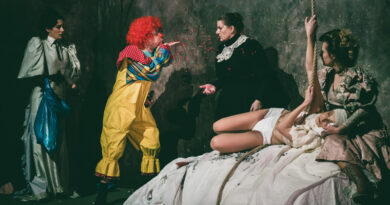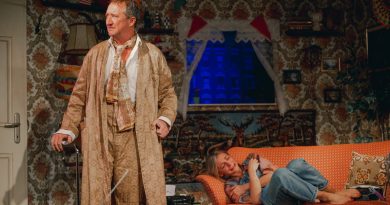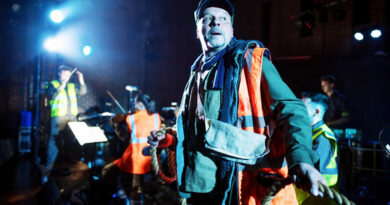“The Deep Blue Sea” at Ustinov Studio, Theatre Royal Bath
Simon Thomas in the South West
10 May 2024
A few decades ago seeing a Terence Rattigan play seemed like an impossibility. Around the time of the playwright’s death in 1977, and during the years following, his work was so deeply unfashionable that producers just wouldn’t touch it. Fortunately, fashion came full circle and in the last 30 years there has been a real resurgence of his work.

Oliver Chris and Tamsin Greig.
Photo credit: Manuel Harlan.
Now, there is no end of opportunities to see what is probably his best-known and most deeply drawn play The Deep Blue Sea, which first saw the light in 1952. Actresses of a certain age fall over themselves to take advantage of what is surely Rattigan’s greatest characterization and there have been some fine performances of his heartbreaking heroine Hester Collyer, from Penelope Wilton to Harriet Walter, the late Helen McCrory, and many besides. But surely few have mined the depths as deeply as Tamsin Greig in this new production at Theatre Royal Bath’s Ustinov Studio, directed by their current go-to director of the classics, Lindsay Posner.
Greig’s performance has an enormous emotional range and tremendous subtlety and truth. She begins the evening in the depths of trauma, following a failed suicide attempt and, in the course of just 24 hours (the play follows perfectly the classical unities), she journeys through despair, self-hatred, futile hope, and finally a tenuous gathering of strength which allows her to “go on living”, when she screws up the ultimate courage required of anyone brought to the edge of extinction by the callousness of others and a lack of self-nurturing.

The ensemble.
Photo credit: Manuel Harlan.
Hester Collyer is a clergyman’s daughter who “marries the first man to ask her and falls in love with the first man to make eyes at her”. Her upbringing appears to have given her no resilience to deal with an emotionally dampened marriage to an older man and an affair with a dysfunctional man-child whose “life ended in 1940”, when the Boys’ Own adventure of dicing with death in the skies over southern England was followed by a brain-numbing career test-piloting aircraft, fuelled by increasing alcoholism, in a post-war world.
Greig grabs with both hands the opportunities Rattigan gives her and there are plenty of telling lighter moments, such as her playfulness when lectured on her behaviour by the emotionally inarticulate young civil servant Philip Welch, whose advice consists of telling her she simply has to buck up and move on. It is a performance of astonishing technical accomplishment, truthfulness, and insight.
What is striking in Rattigan’s taut and honest writing is the lack of emotional intelligence of all the male characters, with the exception of the socially unacceptable, struck-off doctor, the émigré Mr Miller, whose firm but necessary confrontation of the facts pushes Hester to revivifying a life that had seemed too painful to continue. From the emotional repression and awkwardness of Hester’s deserted husband Sir William Collyer to the child-like callousness of the ex-Spitfire pilot Freddie Paige, whose lack of awareness and casual selfishness pushes her to the edge, Hester is surrounded by deep interpersonal inadequacy and emotional stasis.
When played with the truthfulness of Posner’s production, Rattigan’s beautifully turned dialogue comes out as fresh-minted, without sounding nearly as dated as it has in, ironically, earlier productions.
Nicholas Farrell gives a finely observed portrayal of Hester’s soon-to-be ex-husband, the quintessentially English judge and stark representative of his class Sir William Collyer. You can really believe that this is a couple who once had a life together and, perhaps, there isn’t quite the same chemistry between Greig and Oliver Chris, who plays the boorish and intractable Freddie with a blend of oafish unawareness and boyish helplessness. The play always leaves one wondering quite what Hester sees in him and, despite this production’s strengths, the problem isn’t quite overcome, although there are maybe hints in her motherly concern for his appearance, from turning down collars to polishing scuffed shoes.
Finbar Lynch brings enormous sympathy to Miller, the GP turned bookie’s clerk whose earlier crime (probably illegal abortion) is only hinted at. As the young couple from upstairs, who unwittingly interfere with Hester’s recovery, Preston Nyman and Lisa Ambalavanar both impress, while Felicity Montagu is fully rounded as the gossipy, good-hearted housekeeper Mrs Elton. Rounding off a tremendous cast is Marc Elliott as Freddie’s war-time mucker Jackie Jackson, another study in male haplessness.
Peter McKintosh’s box set, all peeling wallpaper and creaky furniture, nestles neatly on the small stage in a production that eschews all gimmicks, giving it straight and serving the playwright to perfection.
Each visit to the Ustinov Studio seems a step-up on a ladder of regional theatre excellence and The Deep Blue Sea ranks as another astonishingly good output of Deborah Warner’s stewardship.









